Welcome to the May edition of Phytogen!
Winter is coming… all over Australia, but the Society continues to shine thanks to its dedicated members. This issue highlights Dr Dugald Reid’s (ASPS whole plant representative contribution) newly installed laboratory at La Trobe University, as well as Dr. Neeta Lohani’s Science Meets Parliament 2023 report and Dr Celine Mens’ R.N. Robertson Travelling Fellowship 2023 report.
Whole Plant Representative contribution
Dugald Reid, Group Leader, School of Agriculture, Biomedicine and Environment, La Trobe University.
Overview of legume nodulation projects at La Trobe University.
Dr. Penelope Smith and Dr. Dugald Reid work on symbiotic nitrogen fixation in legumes at La Trobe University in Melbourne. The lab uses a combination of Molecular Biology, Genetics, Genomics and Biochemistry and now have six legume species growing in the lab. Below is a snapshot of some of the people involved and their projects.
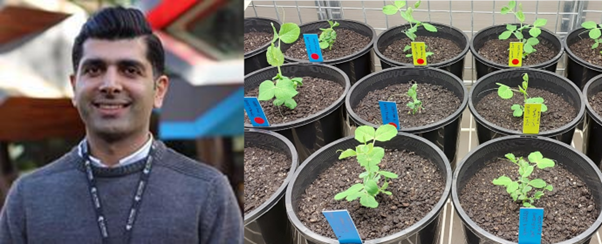
Meysam Khodaparast Afarmajani (above) has recently finished his PhD and has just started a project analysing variation in nitrogen fixation efficiency in diverse pea and lentil germplasm.
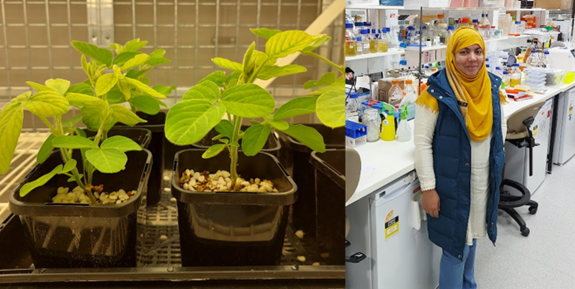
Sumaira (above) is a PhD student investigating the role of transporters in symbiotic nitrogen fixation in soybean.
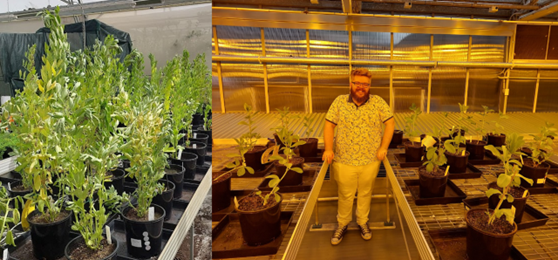
Jacob Heath Golder (above) is purifying faba bean lines for a diversity panel while conducting his Masters project on zinc transporters.
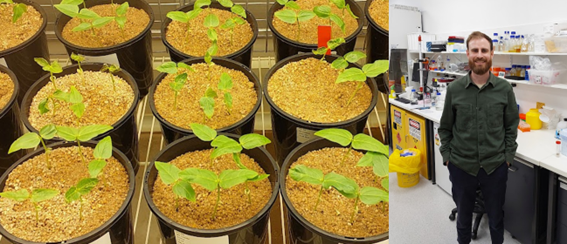
Dr. Ronan Broad (above) is a postdoc evaluating the impact of removing environmental suppression of nitrogen fixation via gene editing in cowpea and soybean.
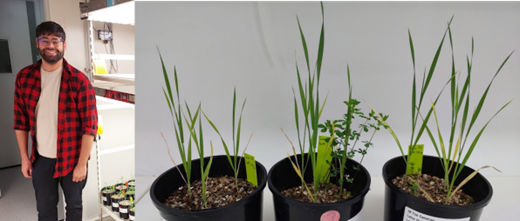
Dr. Tim Cameron (above) is a postdoc investigating the control of nodule function via DAP-seq while establishing a model system to study nitrogen dynamics in intercropped legume-wheat.
Science Meets Parliament 2023 report
Dr. Neeta Lohani, Associate Research Fellow in Agriculture & Plant Science, Food Sciences, Western Sydney University, Richmond, NSW, Australia.
Current Affiliation: Postdoctoral Research Associate, Donald Danforth Plant Science Center, St. Louis, Missouri, USA.
As a scientist interested in the intersection of science and policy, I was compelled to participate in the Science Meets Parliament (SMP) event. This annual gathering fosters discussions between scientists and policymakers on the role of science in shaping Australia’s future. I attended as a delegate representing the Australian Society of Plant Scientists (ASPS), which also sponsored my participation. The event was immensely beneficial, enhancing my advocacy skills, fostering relationships with policymakers, and facilitating interactions with fellow scientists and researchers.
Before the main event in Canberra, I took part in a 3-day virtual program featuring keynote speeches and panel discussions with distinguished scientists, politicians, and policy experts. This preparatory program provided insights into the policy landscape and honed our communication skills. A notable highlight was the presentation by UCLA Professor Terence Tao, regarded as the world’s foremost living mathematician and the 2022 Global Australian of the Year.
The day at Parliament was filled with various activities, starting with a session led by Dr. Cathy Foley, Australia’s Chief Scientist, and Nobel laureate Brian Schmidt. They discussed their experiences in science and its critical role in addressing complex challenges and shaping the future. This was followed by a panel emphasizing the need for collaboration between the scientific community and industry in Australia. I also participated in the parliamentary question time, an enlightening experience. Later that evening, we attended the national gala dinner, which provided a fantastic opportunity to network with prominent scientists and parliamentarians. The dinner included speeches from key government figures such as Richard Marles (Deputy Prime Minister), Ed Husic (Minister for Industry & Science), and Karen Andrews (Shadow Home Minister). A statement by The Hon Ed Husic MP struck a chord with me: “Science isn’t a ‘nice to have’ only when times are good. It is essential to the prosperity of this country, to our national wellbeing, and to a modern economy.” For me, the gala’s highlight was Paul Girriwah House’s didgeridoo performance.
Attending SMP was incredibly valuable for me as both a scientist and an advocate. I am deeply grateful to ASPS and would encourage all researchers to participate in this event, as it provides a crucial platform for engaging with policymakers, underscoring the significance of our scientific endeavours, and fostering collaborations that support evidence-based decision-making.
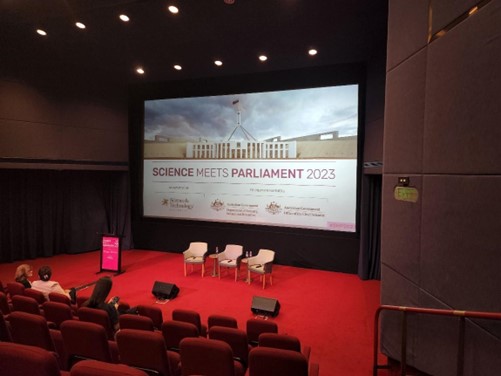
First day and opening event of SMP in person 2023.
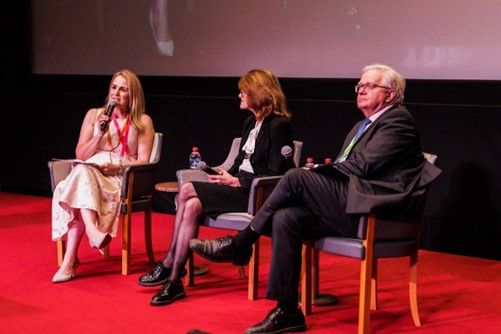
From left to right: Misha Schubert (CEO, Science & Technology Australia), Dr. Cathy Foley (Australia’s Chief Scientist), Nobel Laureate Brian Schmidt (Distinguished Professor and Vice-chancellor of the Australian National University).
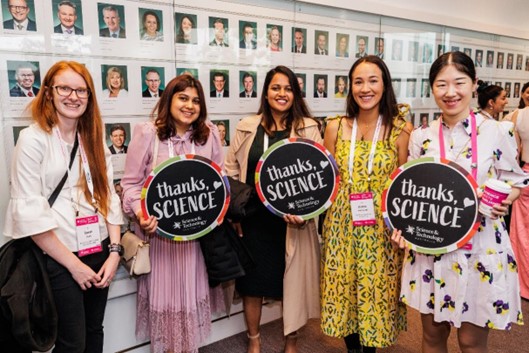
Dr. Neeta Lohani (in the center) with other women delegates at the SMP, 2023
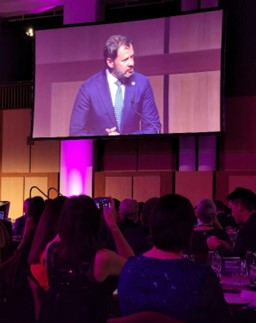
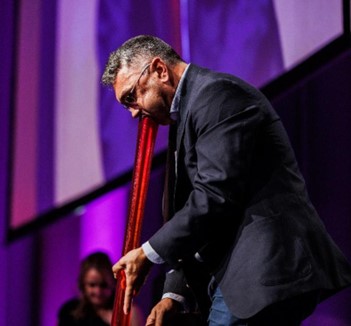
Minister for Industry & Science, The Hon Ed Husic MP and Paul Girriwah House, Ngambri Elder playing the Didgeridoo.
R.N. Robertson Travelling Fellowship report 2023
Dr. Celine Mens, The University of Queensland
I obtained my PhD in molecular plant biology at the University of Queensland in 2022 focussing on nitrogen-dependent regulation of legume nodulation. Since then, I started a postdoc position on legume genomics which involves creating a pan-genome as a tool to improve symbiotic nitrogen fixing efficiency in mungbean. To do so, I generated large amounts of HiFi PacBio and RNAseq data of eight mungbean accessions capturing genetic diversity in an Australian Nested Association Mapping (NAM) population to assemble into a mungbean pan-genome. We had planned to work with the bioinformaticians at the National Center for Genome Resources (NCGR) in Santa Fe, US to help us with the high-computing needed to create a pan-genome and make it publicly available. However, we recognised the importance of also having in-house expertise and knowledge for genome analysis and interpretation within our team.
I had the opportunity to visit NCGR for two weeks with the support of the R.N. Robertson Travelling fellowship in March 2024. The team at NCGR manage the Legume Information System (LIS) which houses genome data for commonly researched legumes like mungbean, cowpea, soybean and peanut. They curate the sequences and provide links between data storage and tools like BLAST as well as tools their team have developed like the Genome Context Viewer. I had the chance to immerse myself in the world of bioinformatics with someone on hand to help trouble-shoot every error that popped up in the HPC (High Performance Computing) terminal. They took me through every step needed to go from sequencing data to a structurally and functionally annotated genome, as well as creating a user-friendly interface that would allow data sharing with my supervisor and colleagues that did not require a terminal interface. While in the same time-zone, I was also able to attend a workshop on differential gene expression run by NCGR while my analyses were running in the background. My PhD research did not rely as heavily on bioinformatics and it has been great to expand my skillset in this way.
On my weekends, I had the chance to explore the beautiful city of Santa Fe with its rich cultural history, the New Mexico landscapes, and the snowy mountains in southern Colorado.
I would like to express my gratitude to the Australian Society of Plant Scientists, the R.N. Robertson Fund and the University of Western Australia for providing me with the funds to visit NCGR. I would also like to give a big thank you to Andrew Farmer and Joann Mudge for their help and time invested, and their continued involvement in this research. Lastly, I would also like to thank my supervisor Michael Udvardi for his support and helping me connect with the team at NCGR.
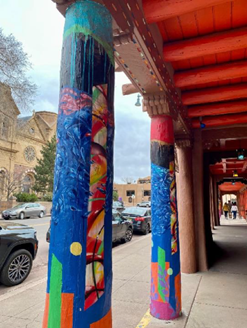
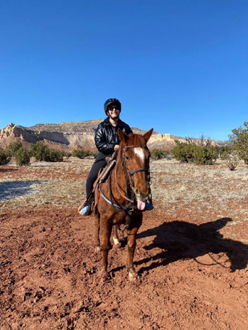
Indigenous art in the town centre of Santa Fe (left) and horseback riding on the weekend in the beautiful New Mexican country (right).
Look out for the next Phytogen edition in late June! In the meantime, we’re looking forward to seeing Australian Plant Scientists at IPMB in Cairns!
“The secret of improved plant breeding, apart from scientific knowledge, is love” – Luther Burbank (1949-1926), American botanist.
Newsletter written and edited by Lucas Auroux and Janet Wheeler.
